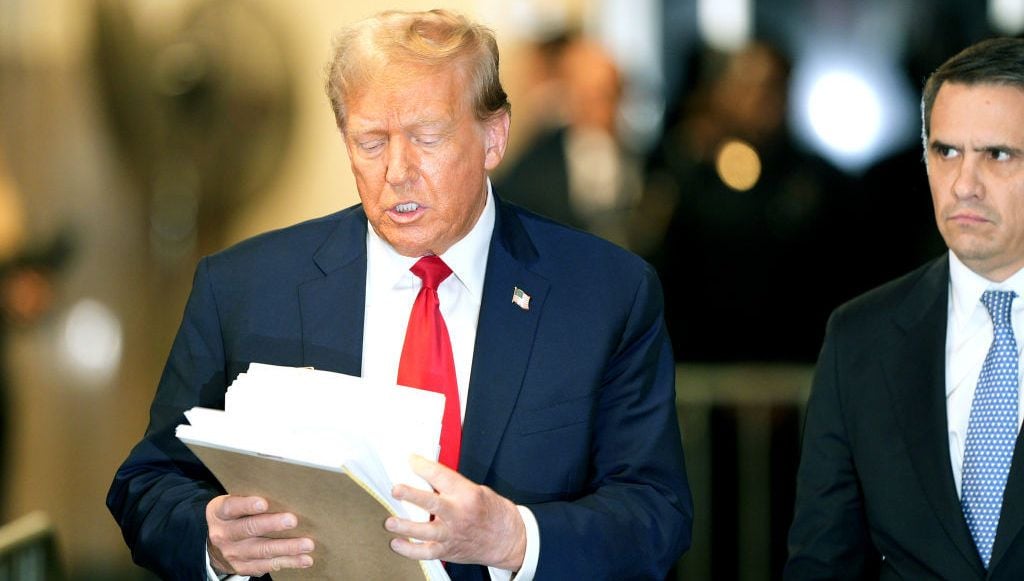FORT PIERCE, Fla. — U.S. District Judge Aileen Cannon assiduously avoided Thursday any discussion of a central issue hanging over Donald Trump’s criminal case for hoarding classified documents at his Mar-a-Lago home: when she intends to bring the case to trial.
At a hearing intended to resolve key pretrial matters, Cannon delved straight into a legal debate about whether Trump was sufficiently aware he could be prosecuted for his handling of the classified materials after he left the White House. That’s one of a long list of issues the judge must resolve before a trial can begin.
Cannon is under intense scrutiny about when she intends to reschedule the trial, currently slated to begin May 20 but expected to be postponed until this summer — or potentially much later. Trump has argued that the trial should not happen until after the November election. Special counsel Jack Smith has asked for the trial to begin in early July, though Cannon expressed doubts earlier this month about whether that would leave enough time to resolve thorny legal matters.
Trump is urging Cannon, whom he appointed to the bench in 2020, to toss the case on various grounds. Cannon scheduled Thursday’s hearing to hear arguments on Trump’s motions to dismiss.
The judge spent the first half of the day-long hearing focused on Trump’s claim that the charges he’s facing are vague and that he could not have known he was committing a prosecutable offense when he stored classified materials at Mar-a-Lago after his presidency. Cannon repeatedly pressed Smith’s team about whether any former senior executive branch official had been prosecuted for a similar crime, suggesting that the absence of such cases undermined the idea that Trump could have been aware he might face charges.
Cannon also fixated on a question about when prosecutors believe Trump began violating the Espionage Act, which makes it a crime to retain sensitive national security information. She asked whether he could have been charged as early as January 2021, when he left the White House.
“If that’s the theory of the indictment, then there would be other officials who clearly would have run afoul of this provision as charged,” the judge said during an early exchange with Trump attorney Emil Bove.
“I think that this is the first of its kind,” Bove emphasized.
Prosecutor Jay Bratt did cite other prosecutions of former government officials, and he noted that President Joe Biden and former Vice President Mike Pence recently faced criminal investigations over their handling of classified records.
Those investigations did not result in criminal charges, and Smith’s team has described Trump’s handling of classified documents as far more egregious than Biden’s. Whereas Biden cooperated fully with a special counsel investigating him, Trump allegedly obstructed the government’s efforts to investigate and retrieve the documents.
“There’s been nothing remotely like this,” Bratt said.
While a series of requests to Trump from officials at the National Archives and later from a grand jury figure prominently in the indictment, under questioning from Cannon, Bratt acknowledged that they were not essential to the government’s claim that Trump had unauthorized possession of the records.
Bratt also noted that the Espionage Act does require prosecutors to show that Trump’s conduct was willful and that the repeated requests underscore that Trump knew his possession of them was unauthorized and that he was required to give them back.
And Bratt noted that the government’s argument that Trump’s possession of the records was “unauthorized” includes the claim that he kept them at his Florida home and social club — a place that prosecutors say wasn’t approved for storage of such sensitive information.
Bratt said that even permission to view restricted government documents doesn’t allow him to take them wherever he wants.
“I can’t take them home and put them in my basement,” he said.
“Certainly, certainly,” Cannon responded.
Trump was present for the hearing, which featured just over two hours of arguments before breaking for lunch, and seemed to take pains not to look in the direction of Smith, avoiding eye contact as he passed within feet of the prosecutor on the way in and out of the room.
Among Trump’s various motions to dismiss, one seeks to toss the case on the grounds that it is effectively precluded by the Presidential Records Act, the 1978 law Congress passed to prevent future disputes of the sort that erupted over Richard Nixon’s records after he resigned from the presidency. That motion was expected to be hashed out at the afternoon session Thursday.
Nixon claimed his White House records were his property, but the federal government never returned them. His estate was eventually paid $18 million for the files and his famous Oval Office recordings.
The PRA created a framework that declares a president’s official records to be government property, but allows former presidents to keep private their personal and political records. Trump and his lawyers contend that he designated the classified records at issue in the case as “personal” because they were among 15 boxes sent from the White House to Mar-a-Lago before the end of his presidency.
Prosecutors argue that there appears to be no proof Trump made any explicit designation of the records as personal and, in any event, doing so wouldn’t immunize him from being charged for retaining classified documents — which they add are inherently important government records, not meant to be designated as “personal.”
“It would do violence to the text [of the PRA] to say a president can simply, by fiat, make what the law requires to be a presidential record a personal record,” Bratt said.
The defense’s attack on the Espionage Act is aimed at the 32 felony charges Trump faces of wilfully retaining national defense information. It does not seek dismissal of the eight other felony charges against Trump related to alleged attempts to obstruct and stymie investigators.
The terms in the Espionage Act are extremely vague. The law, which dates to 1917, covers a wide range of material “relating to the national defense” and imposes a penalty of up to 10 years in prison for various sorts of actions related to such material, including “willfully” failing to return it to the government official or employee “entitled to receive it.”
Critics have long called the law overbroad and a potential threat to free speech, although it’s unclear whether anyone foresaw a situation of the scale and gravity that developed with Trump.
Trump’s lawyers argued that the language in the law about who is authorized to have national-security documents and to whom they’re supposed to be returned is too vague to enforce, but Cannon said the definition of what kinds of information is covered by the statute is well established at this point.
“It’s hard to say that that provision itself is unconstitutionally vague,” the judge said.
Bove also argued that Trump’s experience receiving classified information briefings as a presidential candidate could have led him to expect that he might still have some authority to retain that information after he left office.
“President Trump’s training with respect to classified information handling happened on the job,” the defense attorney said.
Josh Gerstein and Kimberly Leonard reported from Fort Pierce, Fla.; Kyle Cheney reported from Washington, D.C.
Signup bonus from




